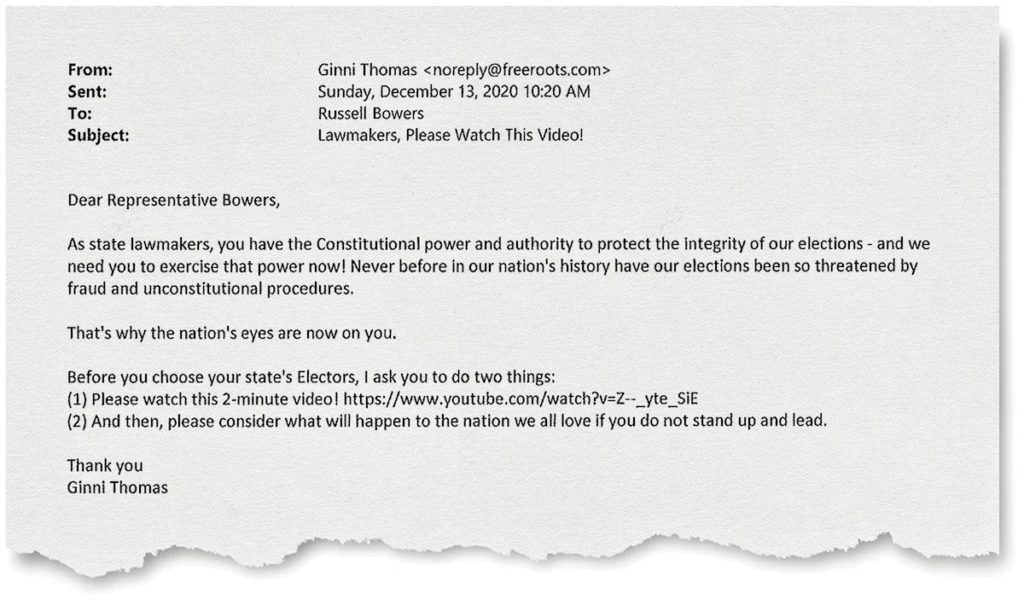
The Supreme Court has dealt with serious issues this past session: Immigration; Climate Change (the court rolled back the EPA’s ability to reduce the country’s carbon footprint; big mistake); in a rarely seen Second Amendment ruling, the court has allowed law-abiding citizens to carry handguns outside the home for self-protection, (Bigger mistake); overturning Roe v. Wade (HUGE MISTAKE).
Then there’s the elephant-in-the-room case, the easiest to settle but will likely never happen.
Believe it or not, the highest court in the land, the court that has the final say on legislation and matters of consequence to us all, does NOT have a code of ethics.
The House has a code of ethics as does the Senate. Even federal judges . . . that’s right . . . even Federal Judges have a code of ethics. But the highest court in the country: zero.
We have only to look at the actions by Justice Clarence Thomas to see the need for such a code.
Thomas’s wife, “Ginni,” while outspoken about her views on a variety of issues (okay, First Amendment, yadda yadda), was called before the House committee investigating the January 6 insurrection because she personally, personally contacted 29 legislators in Arizona in a blatant attempt to swing the 2020 presidential election in favor of Donald Trump.
“The Washington Post reported last month that Thomas sent emails to two Arizona House members, in November and December 2020, urging them to help overturn Biden’s win by selecting presidential electors — a responsibility that belongs to Arizona voters under state law.
“Days after media organizations called the race for Biden in Arizona and nationwide, [a supreme court justice’s wife] urged lawmakers to stand strong in the face of political and media pressure and claimed that the responsibility to choose electors was yours and yours alone. They had power to fight back against fraud and ensure that a clean slate of Electors is chosen, the email said,” despite no evidence of fraud.
If this alone does not constitute proof that the Supreme Court has a monumental ethics problem, nothing does.
Late last month Senator Sheldon Whitehouse (D-RI) took to Twitter: “The first step to recovery is to admit you have a problem . . . At SCOTUS, the problems run deep.”
If this were an outside issue brought before the high court, it would be a no-brainer . . . unanimous decision . . . not a single dissent.
And the ethical violations don’t stop with Justice Thomas.
“A New York Times report published on Saturday chronicled years long efforts by the Rev. Robert L. Schenck, an evangelical minister and former anti-abortion leader, and donors to his nonprofit to reach conservative justices and reinforce anti-abortion views. In 2014, he said, he obtained advance word of the outcome and the author of the decision in Burwell v. Hobby Lobby, a major case about contraception and the religious rights of corporations.
“That decision — like the one leaked this spring, overturning the right to abortion — was written by Justice Samuel A. Alito Jr. Mr. Schenck said he learned the Hobby Lobby details from a donor who had dined with Justice Alito and his wife. Both the justice and the donor denied sharing the information.
“‘We intend to get to the bottom of these serious allegations,’ Mr. Whitehouse and Representative Hank Johnson of Georgia, who respectively lead the Senate and House Judiciary courts subcommittees, wrote in a joint statement.”
Minnesota Democratic Senator Amy Klobuchar tweeted:
This is completely and utterly out of hand. While there are many potential solutions, here’s one that the Court could adopt in one minute: OPERATE UNDER THE SAME ETHICS RULES AS EVERY OTHER FEDERAL JUDGE.
So why don’t they.
Due to a lack of response from anyone on the court, one can only assume that they believe they’re above it all: applies to others, not us; we already know the difference between right and wrong, between what’s ethical and not ethical.
I’ve quoted Justice Potter Stewart before, but perhaps some of the current members should reacquaint themselves with his pointed words about ethics:
“There’s a difference between what you have a right to do and what IS right to do.” Justice Thomas and his wife included.
“There’s no oversight structure that creates rules for the justices and enforces the rules,” Bruce A. Green, a law professor at Fordham University, said in an interview. “The fact that Roberts is the chief justice gives him certain administrative responsibilities, but he’s not the boss of the other justices.”
As a result: the public’s trust and confidence in a long-valued institution suffers immeasurably from the appearance of political bias.
By the way, “Ginni” Thomas told the January 6 committee—absent any evidence—that she believed the 2020 election was fraudulent. And we’re expected to believe that her husband is unbiased? Better still: how would Justice Thomas react to such an argument brought before the court in defense of her actions?
Comments











